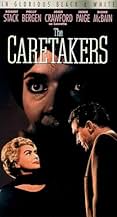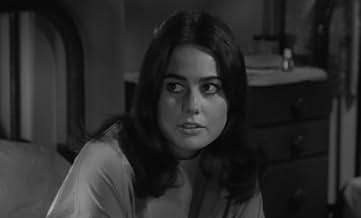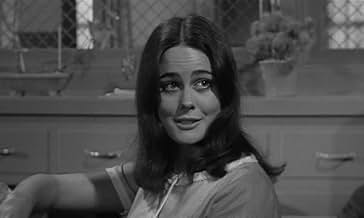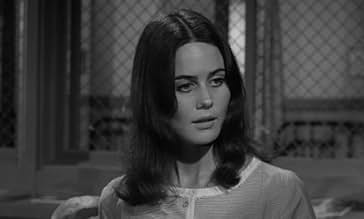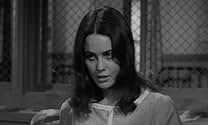VALUTAZIONE IMDb
5,6/10
969
LA TUA VALUTAZIONE
Aggiungi una trama nella tua linguaMedical drama about mentally-ill patients and their professional caregivers, as well as the new group-therapy sessions aiming to replace the traditional physical restraint and electroshock t... Leggi tuttoMedical drama about mentally-ill patients and their professional caregivers, as well as the new group-therapy sessions aiming to replace the traditional physical restraint and electroshock treatments.Medical drama about mentally-ill patients and their professional caregivers, as well as the new group-therapy sessions aiming to replace the traditional physical restraint and electroshock treatments.
- Regia
- Sceneggiatura
- Star
- Candidato a 1 Oscar
- 5 candidature totali
Ana María Lynch
- Ana
- (as Ana St. Clair)
Pamela Austin
- Student Nurse
- (non citato nei titoli originali)
Brian Corcoran
- Tony
- (non citato nei titoli originali)
George DeNormand
- Doctor
- (non citato nei titoli originali)
Recensioni in evidenza
One of the most common interest points for me in seeing any film is good concepts or when it takes on a subject not easy to tackle but always worth addressing. Something that was also covered in 'The Snake Pit' and 'One Flew Over the Cuckoo's Nest'. That was the case with 'The Caretakers'. Plus it had Joan Crawford (though the film was from her twilight years period) and Herbert Marshall in it, Crawford especially was more often than not worth watching despite her film choices being up and down.
'The Caretakers' is not one of her best films, nor does it contain one of her best performances. It is also not one of her worst on either count either. It struck me as a rather disappointing but still semi-watchable film that primarily suffers from how it deals with its subject. It may have had good intentions but it didn't translate in the execution, on this front 'The Caretakers' struck me as somewhat lacking in good taste which was somewhat frustrating.
It is benefitted by some very stylish and atmosphere-laden photography and the setting is suitaably austere. Elmer Bernstein's score has haunting moments.
Did not think much of the acting really, but some of the cast come off well. Polly Bergen may have had some terrible and rather limited dialogue, but she had a quite challenging role and manages to give the character force and nuance. Janis Page also does wonders with a role that sounds one-dimensional but makes it remarkably real.
Elsewhere, we have a stiff Robert Stack looking as if he wanted to be somewhere else, even for a sympathetic character he manages to make the character dull, and Crawford in a part that she should have been perfect for chewing the scenery to smithereens. Marshall also looks ill at ease in a part that has so little to it. None of the characters are written very well at all, too "black and white" so either characters too perfect or ones with not a redeeming bone in their bodies and never really in between (Page's being a possible exception). The direction is bland at best and schlocky at worst.
Although Bernstein's score has moments, too much is ridiculously overblown and over-emphasises the mood too much. The script goes well overboard on the camp, containing some real howlers, and is very awkward such as with poor Bergen in the early stages. The story is a real mess, what could have been a hard hitting and poignant film was instead rather gratuitously distasteful, offered very little insight into the subject, showed no respect for it or its characters and because of its numerous bouts of unintentional humour it was very difficult to take it seriously, something that the writing was not good in general at doing. Almost to an insulting degree.
Concluding, disappointing. 4/10
'The Caretakers' is not one of her best films, nor does it contain one of her best performances. It is also not one of her worst on either count either. It struck me as a rather disappointing but still semi-watchable film that primarily suffers from how it deals with its subject. It may have had good intentions but it didn't translate in the execution, on this front 'The Caretakers' struck me as somewhat lacking in good taste which was somewhat frustrating.
It is benefitted by some very stylish and atmosphere-laden photography and the setting is suitaably austere. Elmer Bernstein's score has haunting moments.
Did not think much of the acting really, but some of the cast come off well. Polly Bergen may have had some terrible and rather limited dialogue, but she had a quite challenging role and manages to give the character force and nuance. Janis Page also does wonders with a role that sounds one-dimensional but makes it remarkably real.
Elsewhere, we have a stiff Robert Stack looking as if he wanted to be somewhere else, even for a sympathetic character he manages to make the character dull, and Crawford in a part that she should have been perfect for chewing the scenery to smithereens. Marshall also looks ill at ease in a part that has so little to it. None of the characters are written very well at all, too "black and white" so either characters too perfect or ones with not a redeeming bone in their bodies and never really in between (Page's being a possible exception). The direction is bland at best and schlocky at worst.
Although Bernstein's score has moments, too much is ridiculously overblown and over-emphasises the mood too much. The script goes well overboard on the camp, containing some real howlers, and is very awkward such as with poor Bergen in the early stages. The story is a real mess, what could have been a hard hitting and poignant film was instead rather gratuitously distasteful, offered very little insight into the subject, showed no respect for it or its characters and because of its numerous bouts of unintentional humour it was very difficult to take it seriously, something that the writing was not good in general at doing. Almost to an insulting degree.
Concluding, disappointing. 4/10
There are only three reasons to see this film. One is to check out yummy, adorable Williams (later to portray "The Green Hornet" on TV) as a psychologist anybody would happily go nuts for. Another is tough, butch, always watchable Ford as a rigid, henchwoman-nurse from hell. Finally, everyone stand back....the queen of the cinema is comin' through!! Joan Crawford! With a unique and flattering hair color and a couple of dandy dresses, Joanie makes the most out of a smallish role as a nurse administrator bent on keeping her hospital stuck in the past, refusing to adapt to the new-fangled ways of Stack. Crawford, though she certainly had some major career highlights, was also seemingly always having to hang on and carve out a career in an ever-changing, ever-threatening Hollywood. That's why this role suits her so well. She and Ford make a wondrous tag-team of brittle, severe, old-guard battle-axes who do everything they can think of to prevent Stack from introducing his modern methods of psychiatric treatment. And who can forget her famed judo class in which she struts around in a figure flattering leotard (with a chiffon sweat scarf!) and tosses adversaries to the ground?! With the ludicrous, artsy, stagey band of group therapy patients who make up Stack's first experiment, how can one help but root for the shackle and straight-jacket team of Crawford and Ford?? Bergen opens the film with a truly embarrassing and overwrought scene at a movie theater. One has to wonder if it was this film which gave her that trademark raspy voice since she screams continuously (and has a penchant for tearing off her own dresses, but that's for Stack to figure out!) Paige is way, w-a-y out there in her "shocking" portrayal of a very loose nutcase, as well. There's even some unheard of actress (who was borrowed from someplace) who has an unhealthy attachment to a bird. This lady's scenes seem to be cut in from another movie altogether as the lighting and cinematography of all of her scenes barely match the rest of the film! Only the all-star cast (which also includes Vaughn, Oliver, Barrie and the shamefully underutilized McBain) makes this thing watchable. This is the basic look (hair style and color), for those that care, that Joan was sporting when she strode onto the stage at the Oscars to collect Anne Bancroft's award (as a snub to Bette Davis who had gotten a nomination for "Baby Jane".) She said she felt it made her look old, but it actually suited her well and was better than the dyed red she went with later on. Keep an eye out for the Pepsi wagon at the hospital picnic. Crawford was quite a pioneer in the product placement racket. Though her brightly-lit close-ups are legendary in this movie, Crawford actually was noted for letting the rather ill Marshall, a pal from the old days of Hollywood, get his work done first so he could be done for the day, thus causing her to be shot later in the afternoon, rather than in the more preferable early hours.
I'm clearly not on the same page as most of the reviewers. First, it's classic Joan Crawford camp. Not only is Joan campy and hilarious as the "head nurse" but the cast of characters kept me enthralled. Look, I don't expect too much "realism" in films about mental illness in the 1960's so I'm not quite getting the disgust that's being expressed.
Marion was also a special treat and her energy shined.
If there is any historical relevance in it is the fact the social norms around the mentally ill were being reconstructed in the 1960's. Not that there was any real legitimacy in how it was portrayed, the fact that it was part of the movie as evidenced by the "borderlines". Even the term "borderlines" is made up, but the point about the conception of the mentally ill having capacity to heal was discussed. I guess 'borderline' was meant to express "only borderline insane".
Look, if you love a good camp film film with great outrageous female characters, this is a great film to watch. A special bonus for those that love Joan Crawford!
Marion was also a special treat and her energy shined.
If there is any historical relevance in it is the fact the social norms around the mentally ill were being reconstructed in the 1960's. Not that there was any real legitimacy in how it was portrayed, the fact that it was part of the movie as evidenced by the "borderlines". Even the term "borderlines" is made up, but the point about the conception of the mentally ill having capacity to heal was discussed. I guess 'borderline' was meant to express "only borderline insane".
Look, if you love a good camp film film with great outrageous female characters, this is a great film to watch. A special bonus for those that love Joan Crawford!
Sixteen years after The Snake Pit and 13 years before One Flew Over The Cuckoo's Nest, The Caretakers joins their company as `enlightened' explorations of the mentally ill and the institutions that hold them. But The Caretakers stays closer in spirit to Caged, with the female inmates transferred from the Big House to a mental ward called (of all things!) Borderline. (There's actually one holdover from the cast of Caged Ellen Corby, as a batty old schoolmarm and one sequence involving a parakeet which almost exactly reprises one involving a cat in the earlier movie.) But while Caged was overwrought but compellingly good, The Caretakers is overwrought and compellingly bad.
The jangly piano music over the titles, with their suggestions of Di Chirico and Picasso's `Guernica,' clue us to the racheted-up, `serious' tone of the movie. But soon we're watching Polly Bergen go flat-out berserk in front of the screen of a crowded theater. An ambulance ushers her into the gloomy shadows (the movie is well photographed) of the mental hospital, where she comes under the care of Robert Stack, who is pioneering progressive and humane methods of treatment (which nonetheless require jolts of electricity to the temples).
But Bergen is but one of the woeful women among whom we divide our time. This is the kind of dramaturgy where, when Barbara Barrie is introduced as never having uttered a word in seven years, we wait 90 minutes with bated breath for her to speak. She's lucky to get a word in edgewise, as recovering prostitute Janis Paige bazoos her way through every scene she's in and steals all the thunder from Bergen's go-for-broke histrionics.
The staff faces its own problems, however. Head of the hospital is Herbert Marshall, looking like he was just trundled in from Madame Tussaud's, but he's just a figurehead who has long since ceded authority to underlings, particularly Joan Crawford. Since she's been saddled with the name Lucretia, with nasty echoes of the Borgias, we know she's not exactly a helping professional. She stands in adamant opposition to everything Stack works for, and relies on head nurse and hard case Constance Ford as her secret agent. Unfortunately, Crawford's role is smaller than we can be sure she hoped it would be (and often her position seems to make sense).
That's about it. We never get to see a promised, climactic board meeting which will decide the fates of Crawford and Stack. That may have been a try for ironic ambiguity, but it looks like the movie just ran out of steam, or money. For some of the patients, rays of hope do pop out of the institutional-grey skies, for Hollywood never acknowledged a problem that couldn't be wrapped up by the last reel. This mixture of high earnestness and wretched overacting is simply stupefying.
The jangly piano music over the titles, with their suggestions of Di Chirico and Picasso's `Guernica,' clue us to the racheted-up, `serious' tone of the movie. But soon we're watching Polly Bergen go flat-out berserk in front of the screen of a crowded theater. An ambulance ushers her into the gloomy shadows (the movie is well photographed) of the mental hospital, where she comes under the care of Robert Stack, who is pioneering progressive and humane methods of treatment (which nonetheless require jolts of electricity to the temples).
But Bergen is but one of the woeful women among whom we divide our time. This is the kind of dramaturgy where, when Barbara Barrie is introduced as never having uttered a word in seven years, we wait 90 minutes with bated breath for her to speak. She's lucky to get a word in edgewise, as recovering prostitute Janis Paige bazoos her way through every scene she's in and steals all the thunder from Bergen's go-for-broke histrionics.
The staff faces its own problems, however. Head of the hospital is Herbert Marshall, looking like he was just trundled in from Madame Tussaud's, but he's just a figurehead who has long since ceded authority to underlings, particularly Joan Crawford. Since she's been saddled with the name Lucretia, with nasty echoes of the Borgias, we know she's not exactly a helping professional. She stands in adamant opposition to everything Stack works for, and relies on head nurse and hard case Constance Ford as her secret agent. Unfortunately, Crawford's role is smaller than we can be sure she hoped it would be (and often her position seems to make sense).
That's about it. We never get to see a promised, climactic board meeting which will decide the fates of Crawford and Stack. That may have been a try for ironic ambiguity, but it looks like the movie just ran out of steam, or money. For some of the patients, rays of hope do pop out of the institutional-grey skies, for Hollywood never acknowledged a problem that couldn't be wrapped up by the last reel. This mixture of high earnestness and wretched overacting is simply stupefying.
Ah, crazy people movies. Nothing actors like better than free range to ham it up under the guise of being insane. You know what's really sad? Fifty years later and the portrayal of mentally ill people in movies really hasn't changed much. Anyway, this movie is a drama about the goings-on at a hospital mental ward. In particular doctor Robert Stack, who tackles his greatest "unsolved mystery" in this film: Joan Crawford. Joan plays a hard-nosed head nurse named Lucretia who doesn't like softie Stack's approach to dealing with the loonies. Dated and often silly, it can be a tough slog to sit through. But whenever Joan's on screen, things are more interesting. Seeing Joan in a leotard teaching her nurses self-defense is a must for every Joan fan! I see several reviews comparing this to The Snake Pit, which I find ridiculous. The Snake Pit was a million times better than this. This is a forgettable drama with good intentions that is only memorable for Joan Crawford's supporting part.
Lo sapevi?
- QuizJoan Crawford went out of her way to help an aging Herbert Marshall with his lines. She also arranged to have his scenes filmed first so he could leave the set early in the day as he was an old friend and in ill health.
- BlooperAs Lorna runs into the hospital, there's nothing outside the door. But the shot from inside shows a small wall just outside the door which she would have had to jump over or go around to enter.
- ConnessioniFeatured in Hollywood: The Great Stars (1963)
I più visti
Accedi per valutare e creare un elenco di titoli salvati per ottenere consigli personalizzati
Dettagli
Botteghino
- Lordo Stati Uniti e Canada
- 2.050.000 USD
- Lordo in tutto il mondo
- 3.160.000 USD
- Tempo di esecuzione1 ora 37 minuti
- Colore
- Proporzioni
- 1.66 : 1
Contribuisci a questa pagina
Suggerisci una modifica o aggiungi i contenuti mancanti

